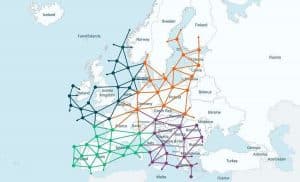
A European wide ‘supergrid’ could cut almost a third from energy costs according to a new study from the UCD Energy Institute.
Evaluating the capabilities of Europe’s energy network, the study, commissioned by SuperNode, found that a pan-European transmission system would reduce energy costs by 32 percent compared to the current approach.
“The existing transmission system is not fit for purpose for Europe’s energy future,” said Professor Andrew Keane, UCD School of Electrical and Electronic Engineering and UCD Energy Institute Director, who led the study.
The 32 percent cost reduction identified is borne primarily from the expansion of European power flows—derestricting them to allow the location of renewable generation to be optimised, thereby significantly decreasing the total installed capacity.
While this scenario proposes an increase in transmission capacity, the costs were found to be insignificant compared to the cost savings in generation investment over the same period.
This study was an extension of work carried out by SuperNod, based on their Energy Scenario for Europe 2050 modelling—which aims to predict future energy trends across the continent.
SuperNode, headquartered at NovaUCD, designs and delivers superconducting bulk power transmission products to enable the future growth in large-scale renewables to help create a decarbonised energy supply.
Its modelling work, validated and extended by the UCD study and facilitated through ConsultUCD, demonstrates the net benefit of large investment into the development of new transmission assets to ensure more efficient utilization of Europe’s renewable resources; highlighting bottlenecks where investment is required, such as higher levels of grid storage.
“The work done by the UCD team reconfirms the Irish and European grid reliability challenges,” said SuperNode Market and Policy Analyst Marcos Byrne.
“This will only worsen as more renewables are integrated, unless a new mindset in grid development is adopted.
“The study shows a 32 percent energy cost reduction can be achieved by a pan-EU transmission system when compared to a ‘Business as Usual’ approach, highlighting that scenarios facilitating larger power flows result in lower system cost, to the benefit of energy consumers.”
Another key finding from the UCD study is that the existing transmission system is not fit for purpose for Europe’s energy future.
Without accelerated investment in infrastructure, Europe will face challenges with load shedding, generation curtailment and excessively high emissions.
The failure to achieve decarbonisation targets will not just undermine international climate efforts but will adversely affect Europe’s economies and ability to compete on a global scale, the report notes.
“This reinforces SuperNode’s belief in the need for new transmission technologies to reduce energy costs and we are confident that the superconductive transmission systems SuperNode is developing will be a key enabler of Europe’s energy transition,” Macros Byrne added.
